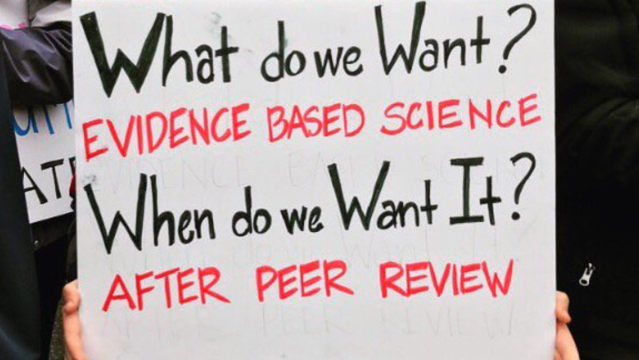In the Trump administration’s first week, the newly elected POTUS has followed through on his promise to silence scientists at federal institutions. In the last few days, the White House ordered media gags on the EPA and the USDA. It also forced the National Park Service to cease communications on Twitter after it tweeted facts about climate change.
Image credit: @snydertron5000
Needless to say, scientists around the country — and world — are horrified.
After the overwhelming success of the Women’s March on Washington, DC, which drew in at least 500,000 participants, this week concerned scientists decided to similarly mobilize. While their event — called the March for Science — is still in its very early planning stages, scientists and citizens alike are ready to get to work; in just two days, the @ScienceMarchDC twitter account exploded to almost 35,000 followers.
What started as idea on Reddit’s r/politics subreddit has quickly become something much larger. In addition to its popular Twitter handle and accompanying hashtag — #ScienceMarch — the March for Science now has its own website and Facebook page. Co-chairs Caroline Weinburg, a health writer, and Jonathan Berman, a University of Texas Health Science Center postdoctoral fellow, have been flooded with Google form requests to participate — and they haven’t even decided on a date for the march yet.
“Our motivation is pretty straight forward,” Weinburg said in an email to Gizmodo. “Scientists worldwide have been alarmed by the clear anti-science actions taken by the Trump administration. It has been less than a week and there have already been funding freezes and efforts to restrict scientists from communicating their findings (from tax-funded research!) with the public. These actions are absurd and cannot be allowed to stand as policy.”
I’m a woman + member of Cherokee Nation + researcher and I’ll be supporting #ScienceMarch all the way. #resist #NoDAPL #indigenouswomenrise
— Diana C. Hereld (@pathwaysinmusic) January 25, 2017
Like the Women’s March, the March for Science is casting a wide net in terms of attendees. Scientists and science supporters from all walks of life say we can’t afford to wait — the time for action is now.
“Marching is important to me because it feels like ‘fact’ has become a subjective term,” Summer Ash, Director of Outreach for the Department of Astronomy at Columbia University, told Gizmodo in an email. “Not enough people understand how science works and how science plays a role in their lives — and not just their cell phone.”
“Science is behind how [people] put food on the table, how they power their homes, how they care for their children, etc,” Ash continued. “Science isn’t something you believe in, it’s a tool/process for understanding how things/the world/the universe works.”
Scientists employed by government agencies, who are arguably most at risk for fund cuts under the Trump administration, say they will be marching, too.
“What the new administration is doing is beyond anything anyone at my office has ever seen,” a scientific technician who works for a federal agency and preferred not to be quoted by name told Gizmodo. “There are folks here who have been working for Interior and in water resources for 30-plus years. We have contracts with the EPA that are now up in the air; we have no idea what’s going to happen with our funding.”
Not all who plan on attending the march are scientists. Many are concerned parents who fear for their children’s future under an administration that the efficacy of vaccines, to name a few of its more egregious anti-science stances.
“I want to march in support of science because I believe in facts,” a mother of two boys from the Bronx, NY, who also preferred to remain anonymous, said. “I believe in data. I want our children (and, frankly, adults) to be educated, to understand proper sources, and to cite appropriate references.”
“I will march because I’m tired of the malarkey.”
The incessant “malarkey” has become too much for scientists to bear. Michael Halpern, deputy director of the Center for Science and Democracy at the nonprofit science advocacy group Union of Concerned Scientists says he’s not surprised many of his colleagues are ready to fight back.
“The overwhelming interest in a scientist march shows that facts still matter to people, and that efforts to erode the role of science in our democracy will be met with direct resistance,” he told Gizmodo. “This is only the beginning of a movement to protect the independence of science, and to defend scientists working in government agencies like the EPA who are responsible for keeping Americans safe from public health and environmental threats.”
Another supporter of the march — a fourth year PhD student in finance — put it more succinctly.
“Fuck this guy,” he said.
